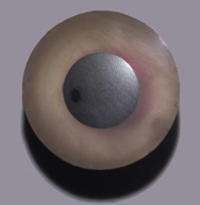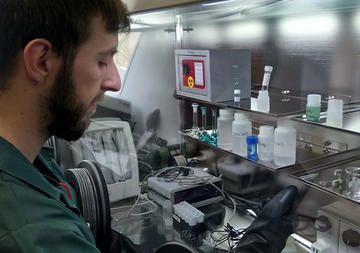
A uranium dioxide pellet electrode prepared in UTGARD Laboratory
© Lancaster University 2020

A postdoctoral researcher prepares a radioactive liquid sample for analysis
© Lancaster University 2020
Reflecting the fuel used in the UK’s current Advanced Gas-cooled Reactors (AGRs) and Light Water Reactors (LWRs), and to be used in new build LWRs, UTGARD Phase II will focus on oxide SIMFUELs – although, with an eye to future fuel cycles, this will include Mixed Oxide (MOX) and ThO2-based fuels. This new facility is designed to extend and interact with Lancaster’s existing radiochemical lab for open sources, UTGARD, creating an effective synergistic single R&D facility and enabling research in the following themes:
1) Development of new, advanced sintering routes for the fabrication of SIMFUELs with porosities, fission product loadings, and defect microstructures that better simulate those of real spent nuclear fuel (UTGARD Phase II).
2) Behavioural studies of advanced SIMFUELs, as well as those prepared using conventional techniques, under a range of conditions relevant to the back end of the fuel cycle – including wet/dry interim storage, geological disposal and new reprocessing routes (UTGARD Phase I).
For all fabrication methods in theme 1, samples of each simulant created by UTGARD researchers and, with permission, by external users will be retained on-site, so creating a library of well characterised SIMFUELs for use by external researchers who do not wish to create their own materials.